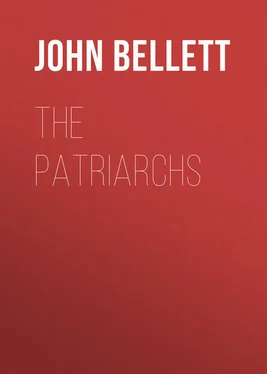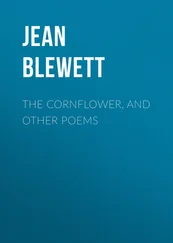John Bellett - The Patriarchs
Здесь есть возможность читать онлайн «John Bellett - The Patriarchs» — ознакомительный отрывок электронной книги совершенно бесплатно, а после прочтения отрывка купить полную версию. В некоторых случаях можно слушать аудио, скачать через торрент в формате fb2 и присутствует краткое содержание. Жанр: foreign_antique, foreign_prose, Биографии и Мемуары, на английском языке. Описание произведения, (предисловие) а так же отзывы посетителей доступны на портале библиотеки ЛибКат.
- Название:The Patriarchs
- Автор:
- Жанр:
- Год:неизвестен
- ISBN:нет данных
- Рейтинг книги:4 / 5. Голосов: 1
-
Избранное:Добавить в избранное
- Отзывы:
-
Ваша оценка:
- 80
- 1
- 2
- 3
- 4
- 5
The Patriarchs: краткое содержание, описание и аннотация
Предлагаем к чтению аннотацию, описание, краткое содержание или предисловие (зависит от того, что написал сам автор книги «The Patriarchs»). Если вы не нашли необходимую информацию о книге — напишите в комментариях, мы постараемся отыскать её.
The Patriarchs — читать онлайн ознакомительный отрывок
Ниже представлен текст книги, разбитый по страницам. Система сохранения места последней прочитанной страницы, позволяет с удобством читать онлайн бесплатно книгу «The Patriarchs», без необходимости каждый раз заново искать на чём Вы остановились. Поставьте закладку, и сможете в любой момент перейти на страницу, на которой закончили чтение.
Интервал:
Закладка:
There is, however, another thing to be said on the times and on the Book of Genesis.
In those times, or, as the apostle speaks, "from Adam to Moses," law did not give character to the state of the people of God. Adam was under law in Eden, and so were the children of Israel after the day of Mount Sinai. But not so the generations from Adam to Moses. Sin was equally in the world, but there was no law. Rom. v. 14.
But not only, I may observe, were they not under law; there was also almost a total absence of moral or preceptive instruction. Much revelation of the divine pleasure and counsels there was; but scarcely anything of precept. Under the Spirit, revelation worked its result on character and conduct, and formed the mind and the ways of the saints. Evil was resented by them, and judged of God; but without a written standard of right and wrong. Without any law against murder, Cain is exposed; without a fifth commandment, Ham's dishonour of his father is punished. And so Jacob's guile is visited and resented by the Lord; and the wicked way of Joseph's brethren. And without the light of any precept the soul of a saint can thus plead with temptation, How can I do this great wickedness, and sin against God?
All this is so, though neither law nor moral instruction was then published. It was revelation in matters of faith which, under the Spirit, formed patriarchal character. Abraham was not enjoined either his altar or his tent; but his call of God, through the Spirit, suggested both. No precept required his high, generous treatment of Lot; but his faith and hope in God dictated and commanded it. Without direction on the case, his knowledge of God and the mind of Christ that was in him disposed him, and taught him to let the potsherds of the earth strive with their fellows, but as soon as his kinsman was a captive to go forth for his deliverance. No word, no oracle from God, distinguished for him between the king of Salem and the king of Sodom; but the light that was in him did.
I might go through other histories in this book, and find these same things. The holy judgment of the mind that was in them, under the Spirit, suggested to those early saints conduct by means of revelation, promise, and calling of God. And this is ever beautiful, when we get genuine samples or instances of it.
Such then are among the characteristics of this earliest and infant age of our history, and of the precious book which records it. And this earliest method in the way of the Lord is to be the last and the abiding method. In Genesis, as we have seen, the Lord God acted "in the human guise," being personally present in the scene, and seeking the nearest intimacy with His creature. And this is to be the eternal thing when dispensations are over. God in manhood is to be for ever!
Precious mystery! Unfathomable wonder! Blessed to ponder this. The first is to be the last. The song of salvation-the "song of Moses" – was the first breath of the ransomed tribes. It was sung on the banks of the Red Sea, just as they had got beyond the reach of Pharaoh. After experiences were different. They had then to do with themselves. But at first the victory of the divine "man of war" was everything to them. And this first thing is to be the eternal thing. The song of Moses is to fill the courts of glory. Exodus xv.; Rev. xv. And so in earliest days, in Genesis days, the divine presence was not deemed strange, or something which did not suit the earth, or belong to man. The divine courtesies were then, so to speak, freely given, and unsuspectingly received. And so at the end, in days of millennial heavens and earth, the Lord God will be personally again in the scene.
The first five chapters of this book give us an account of antediluvian times, or, as they have been called, "the world before the flood." And it is those chapters I now purpose to look at a little particularly.
The whole opens, as of course, with the work of creation. I speak not particularly of this. But, instructed by the apostle, we may say that it is only faith which deals justly with this great work. Faith puts God above all the things that were made, or are seen. "Through faith we understand that the worlds were framed by the word of God, so that things which are seen were not made of things which do appear." Faith treats God worthily-the only principle in the soul which does so. He dwells "in the light which no man can approach unto." Faith owns this. The wisdom of men busies itself in seeing or inspecting Him. But though He will "show" great things of Himself, yet does faith know that no man hath seen or can see Him. 1 Tim. vi. It enjoys all His manifestations; but inspects not His dwelling-place in light.
The second chapter exhibits the man made in the image of God, in his estate in the garden of Eden. All there was tributary to him, all was for him. He had food for all the faculties and desires of his nature, and provision of all desirable things. He was made, however, to impart as well as to receive; and that is ever a necessary feature in the happiness of a well-ordered mind. He was important to the garden, as the garden was important to him. He had "to dress it and to keep it." And he saw his dwelling-place the spring-head of a fruitful river, which went forth with life and refreshing to the whole earth. With all this the voice of a Sovereign was heard. A command went forth. "Of the tree of the knowledge of good and evil, thou shalt not eat." But this was no trespass, no discordant note on the ear of Adam. God will not, and cannot, give His glory to another. And a creature of a right thought, "made upright," as Adam was, must delight in having it so. All this was therefore only harmonious and consistent happiness.
To perfect his condition the Lord God celebrates for him a coronation day, and a day of espousals. But this action has an order in it. The Lord takes counsel with Himself about Adam's espousals. This is done first . Then He introduces him to the scene of his sovereignty. He brings the creatures of the field and of the air to Adam, to see what he would call them, and whatsoever he called every living creature, that was the name thereof. This was investing him with dominion, setting the crown royal on his head. Then He prepares the help-meet, and presents Eve to him, following his coronation with his marriage.
This is the order of these events-an order which has a sacred and interesting sense in it. It is not the mere progress of independent facts. It is the design, so to speak, of a great master. For there is, as we now know, a mystery which had been "hid in God," "purposed in Himself," before the foundation of the world, His secret (Eph. iii.), of which this marriage in the garden of Eden was the type. Eph. v. And according to this the Lord, in the solitude of His own presence, in the musings of His own bosom, ere He led forth Adam into his kingdom, prepares his help-meet for him.
This, however, is not merely the design of a great master , but the well-known way of a perfect love .
The richest purpose of joy is the first in counsel.
The Lord's earliest thought was about Adam's best blessing. The help-meet at his side, the one like unto him, his companion, was destined to be more to him than all beside. And that which was chief in his enjoyments was the earliest and deepest thought in the mind of his Lord. His Lord pondered it. He spoke of it to Himself. His coronation was taken in hand at once and disposed of; but the getting of his help-meet for him was counselled and talked of beforehand.
This is the way that love would take. We know it ourselves. We like to dwell in thought over the materials of the happiness of one we love. So that all this is sweet and important to our hearts; for we read in it that which may again draw out the admiration and the worship, "Behold, what manner of love the Father hath bestowed upon us!"
Читать дальшеИнтервал:
Закладка:
Похожие книги на «The Patriarchs»
Представляем Вашему вниманию похожие книги на «The Patriarchs» списком для выбора. Мы отобрали схожую по названию и смыслу литературу в надежде предоставить читателям больше вариантов отыскать новые, интересные, ещё непрочитанные произведения.
Обсуждение, отзывы о книге «The Patriarchs» и просто собственные мнения читателей. Оставьте ваши комментарии, напишите, что Вы думаете о произведении, его смысле или главных героях. Укажите что конкретно понравилось, а что нет, и почему Вы так считаете.












